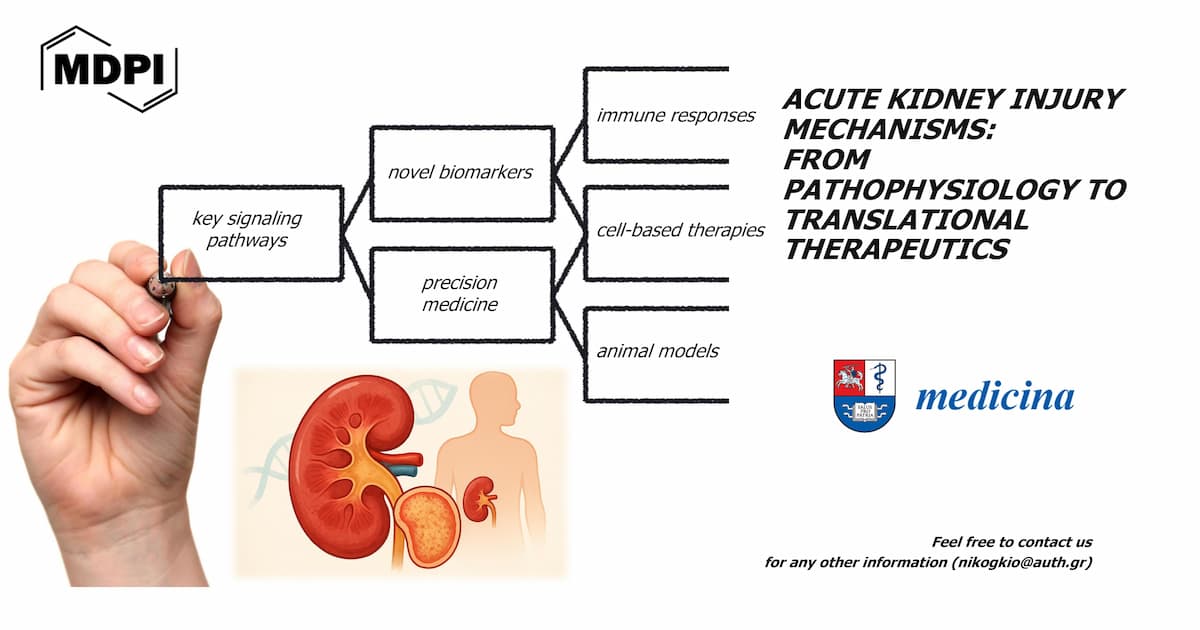Acute Kidney Injury Mechanisms: From Pathophysiology to Translational Therapeutics
A special issue of Medicina (ISSN 1648-9144). This special issue belongs to the section "Urology & Nephrology".
Deadline for manuscript submissions: 30 May 2026 | Viewed by 641

Special Issue Editors
Interests: pediatric nephrology; pediatrics; NICU; pediatric hepatology
Special Issue Information
Dear Colleagues,
Acute kidney injury (AKI) remains a major clinical challenge, contributing to high rates of morbidity, mortality, and progression to chronic kidney disease. Despite advances in supportive care, effective therapies to prevent or treat AKI remain limited. A deeper understanding of the complex mechanisms underlying AKI is essential for translating basic discoveries into innovative therapeutic strategies.
This Special Issue will focus on the cellular, molecular, and systemic mechanisms that drive AKI in diverse clinical contexts, including sepsis, ischemia–reperfusion, nephrotoxic injury, and cardiorenal syndromes. This Special Issue will also place emphasis on the study of pathways of inflammation, oxidative stress, mitochondrial dysfunction, cell death, microvascular injury, and maladaptive repair. Contributions exploring novel biomarkers, animal models, and translational approaches that bridge experimental findings with clinical application are strongly encouraged.
In addition, the Special Issue seeks to highlight the therapeutic potential of targeting key signalling pathways, immune responses, and regenerative processes. Studies investigating pharmacological interventions, cell-based therapies, and precision medicine approaches will provide valuable insights into future treatment options of AKI.
By bringing together original research articles, reviews, and perspectives, this Special Issue aims to serve as a platform for advancing the knowledge of AKI pathophysiology and for identifying novel therapeutic opportunities. Through this integrative effort, we hope to bridge the gap between bench and bedside, ultimately improving outcomes for patients affected by acute kidney injury.
Please feel free to contact us for any further clarification or information.
Dr. Nikolaos Gkiourtzis
Guest Editor Assistant
Dr. Despoina Tramma
Guest Editor
Manuscript Submission Information
Manuscripts should be submitted online at www.mdpi.com by registering and logging in to this website. Once you are registered, click here to go to the submission form. Manuscripts can be submitted until the deadline. All submissions that pass pre-check are peer-reviewed. Accepted papers will be published continuously in the journal (as soon as accepted) and will be listed together on the special issue website. Research articles, review articles as well as short communications are invited. For planned papers, a title and short abstract (about 100 words) can be sent to the Editorial Office for announcement on this website.
Submitted manuscripts should not have been published previously, nor be under consideration for publication elsewhere (except conference proceedings papers). All manuscripts are thoroughly refereed through a single-blind peer-review process. A guide for authors and other relevant information for submission of manuscripts is available on the Instructions for Authors page. Medicina is an international peer-reviewed open access monthly journal published by MDPI.
Please visit the Instructions for Authors page before submitting a manuscript. The Article Processing Charge (APC) for publication in this open access journal is 2200 CHF (Swiss Francs). Submitted papers should be well formatted and use good English. Authors may use MDPI's English editing service prior to publication or during author revisions.
Keywords
- acute kidney injury
- pathophysiology
- inflammation
- oxidative stress
- mitochondrial dysfunction
- biomarkers
- translational research
- therapeutic development
- renal regeneration
Benefits of Publishing in a Special Issue
- Ease of navigation: Grouping papers by topic helps scholars navigate broad scope journals more efficiently.
- Greater discoverability: Special Issues support the reach and impact of scientific research. Articles in Special Issues are more discoverable and cited more frequently.
- Expansion of research network: Special Issues facilitate connections among authors, fostering scientific collaborations.
- External promotion: Articles in Special Issues are often promoted through the journal's social media, increasing their visibility.
- Reprint: MDPI Books provides the opportunity to republish successful Special Issues in book format, both online and in print.
Further information on MDPI's Special Issue policies can be found here.







